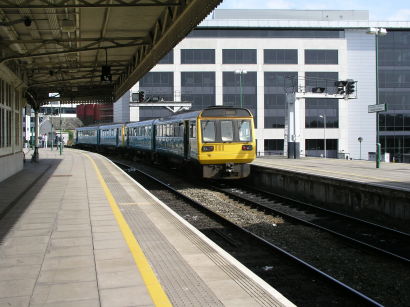UPDATED 30.11.18, 11.58
THE poor state of the Welsh train fleet is being largely blamed on the previous franchise holder Arriva, although Arriva has said that it acted in good faith.
Many rail services in Wales are still short-formed or being replaced by buses, after many trains were damaged by the autumn conditions. However, there have been talks with Network Rail, and the situation is now reported to be improving.
Arriva took control of the first Wales & Borders franchise in 2003 and ran it until October this year, but there were no provisions in its contract for any replacement rolling stock. As a result, nearly all the trains on Wales & Borders routes were built at least 30 years ago, in the days of British Rail.
Speaking in the National Assembly, transport secretary Ken Skates said that contract had been ‘dreadful’.
He said: ‘We inherited a fleet of trains that have been very poorly maintained, which we did not have full and proper access to ahead of inheriting them, and that, along with Storm Callum, and taking over the franchise in the autumn period, presented huge challenges for Transport for Wales and the operator and the delivery partner.
‘The standards of the delivery of the services were too low, because the contract that was agreed 15 years ago was not fit for purpose, and so, essentially, Arriva Trains Wales had a lower bar to get over. We had no levers at our disposal, no powers and no way of compelling Arriva Trains Wales to up the bar to improve the standard of service, and that includes maintenance. So, in particular in the period leading up to the transfer of the franchise, there was no commercial incentive for Arriva Trains Wales to invest in maintenance over and above what was essential through law.’
Mr Skates also confirmed that the number of trains available for service each day is still well below the requirements of the full timetable. He explained: ‘Transport for Wales, as the managing and operator partner for Welsh Government, would like to apologise, but I think it also needs to be recognised that, in a very short space of time, Transport for Wales have worked incredibly hard to bring a number of trains back into use.
‘Normally, we operate at about 80 per cent of the entire fleet. There are 127 trains in the fleet, so normally we’d be operating at around about 105, with the remaining trains in for servicing and maintenance. I can tell the Member that, as of this morning, the number was up to 96. We’re therefore operating at around about 76 per cent. It will return to normal—back to the 80 per cent—within a few weeks.’
Mr Skates also confirmed that the lack of wheel-slide protection on the former British Rail trains was another factor, which became critical in the leaf-fall season. He said: ‘The problem with the transfer of the franchise was that Transport for Wales were not given full and proper access to be able to gauge the condition of it. However, what they did do was make sure that there were enough wheel sets. This is part and parcel of the problem now. The wheel sets were flattened as a consequence of the lack of traction. So, they ordered a sufficient number of wheel sets, but it still takes time to take the trains off the rails and apply the new wheel sets.’
He added: ‘We're looking into the reasons why this issue affected the Wales and Borders network more than other parts of the UK. What we have found is that none of the rolling stock on our franchise are operating with wheel-slide protection. This is significant because trains across the rest of the UK have been operating with that protection. What we have now learnt is that, potentially, the problems were worsened in Wales because in the absence of wheel-slide protection and as a consequence of a decision taken in 2016—and this is across the UK—to stop applying sand to rails, it meant that the traction on Welsh rail lines has been worse this autumn.’
Mr Skates has also been in discussions with Network Rail chairman Sir Peter Hendy, and said ’there have been significant improvements in the space of a week, with more than 10 per cent of the trains now having been brought back into use, but this remains a very challenging period due to the dreadful underinvestment in our rail network over the past 15 years.’
In response, Arriva said: ‘Over £30 million has been invested by Arriva into the railway in Wales over the past fifteen years and we have left the network in a much stronger and safer condition than when we found it.
‘We have acted in good faith as the franchise has come to an end and actively invited Transport for Wales and the new franchise holder to work with us ensure as smooth a transition as possible.
‘We provided access to our fleet and staff for many weeks prior to the handover and worked in an open and transparent way with all parties to develop a mutually agreed handover plan.
‘This year we delivered our autumn preparedness plan in full and, in doing so, increased spending on train maintenance relative to previous years. In this instance, and others, we have gone above and beyond our contractual obligations.
‘All spare parts and tools within our control were transferred to the new franchise holder with all parties having access to take stock reviews prior to transfer.’


